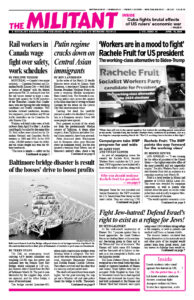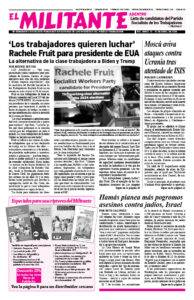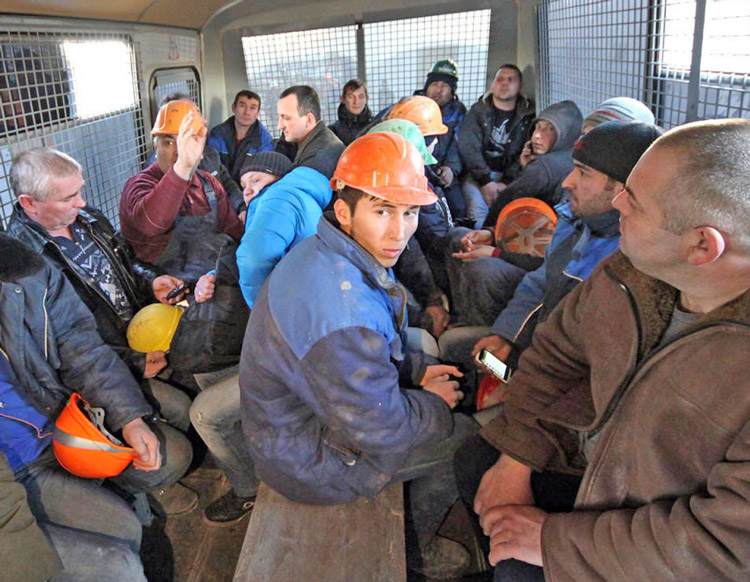In the wake of the March 22 deadly Moscow terror attack by Islamic State Khorasan, a reactionary Islamist outfit, Russian President Vladimir Putin’s regime is targeting Muslim immigrants from Central Asia. The Kremlin is conducting police raids across the country at the same time that it’s trying to blame Ukraine for the attack on the Crocus City Hall entertainment venue.
Leaving 144 dead, the carefully planned assault is the deadliest IS operation in a European country. Some 360 more people were injured.
Four gunmen accused of the attack are from the predominantly Muslim country of Tajikistan. A dozen other suspects, from Tajikistan and other Central Asian countries, have been arrested.
Putin dismissed alerts Washington and its European allies gave Moscow about an imminent attack. But he also ignored a warning from Tehran, one of Moscow’s military allies, about a big “terrorist operation.” Iranian interrogators had gleaned this from Islamic State operatives who were Tajik, captured after deadly twin blasts in the city of Kerman Jan. 3.
Tajikistan is the poorest country in Europe and Asia. Nearly a million Tajik immigrants work in Russia. Some 2 million more immigrants in the country are from the mainly Muslim former Soviet republics, including Uzbekistan, Kyrgyzstan, Turkmenistan and Kazakhstan.
Russia’s population has been shrinking since 1993. Today young adults aged 25 to 30 are 5 million fewer than a decade ago. The only offsetting factor is a net immigration from Central Asia of over 200,000 last year.
Nine people suspected of links to the Islamic State Khorasan terror group were detained in Tajikistan two days after the attack. Families of the four alleged gunmen were also rounded up.
In Blagoveshchensk, a city in the Amur region of Russia’s Far East, a shopping center used by Central Asian migrants was set on fire. In Kaluga, southwest of Moscow, a group of people beat up three Tajik citizens, hospitalizing one. At least 30 similar cases of violence against immigrants have been reported.
Police raids on dormitories, apartments and workplaces where Central Asian immigrants live and work have sharply increased. Large-scale deportations have begun.
On March 27, cops and the national guard raided a huge warehouse on Moscow’s outskirts, demanding to see the passports and work permits of 5,000 workers. Police used batons to beat those who tried to resist. Some 40 people were detained.
An operation in St. Petersburg called “Anti-Migrant” was launched to identify and deport foreigners without residency papers.
Human rights lawyer Valentina Chupnik told the Moscow Times she got over 3,000 requests for help in the first 72 hours following the terror attack. “There are 118 people who were beaten by the police and more than 400 people who were subject to tortuous conditions,” she said. Many are held with “no food, no water and no access to the toilet.”
Immigrant workers are a vital source of cheap labor — and big profits — for Russia’s capitalists. They fill jobs from factories and construction to supermarkets and food delivery, as well as taxi and truck drivers. Putin is using the terror attack to intensify assaults on immigrant workers to try to deepen divisions among working people as a whole and to shore up dwindling support for his regime’s war to conquer Ukraine.
“Tajiks are really afraid that the Russian authorities will start sending Tajiks to the front en masse to fight as a sort of revenge against our people,” Saidanvar, a Tajik rights activist, told the New York Times.
Young men from Muslim minority ethnic groups in the Russian Federation already make up a disproportionate number of Russian army soldiers fighting and dying in Ukraine. Putin made it easier for immigrants to become citizens at the start of the war to expand the Kremlin’s pool of potential military recruits. As police raids surge today, more immigrants are being taken to military registration offices or deported.
Over the last 18 months Putin has avoided a new round of forced service for the front. The last one in September 2022 triggered widespread anti-war protests. But on March 31 he signed a decree calling up 150,000 men for military service to back up his depleted forces in Ukraine.
The Kremlin claims the Islamic State gunmen admitted to links with Ukraine — after the use of torture. The Ukrainian government vehemently denies this. The Russian government’s Investigation Committee said it’s now probing the “organization, financing, and conduct of terrorist acts by the United Sates, Ukraine and other Western countries directed against Russia.”
Putin has a long record of utilizing terrorist atrocities as a pretext to attack political rights. In the wake of the seizure of a Moscow theater in 2002 by Chechen forces, he pushed through laws strengthening government control.


